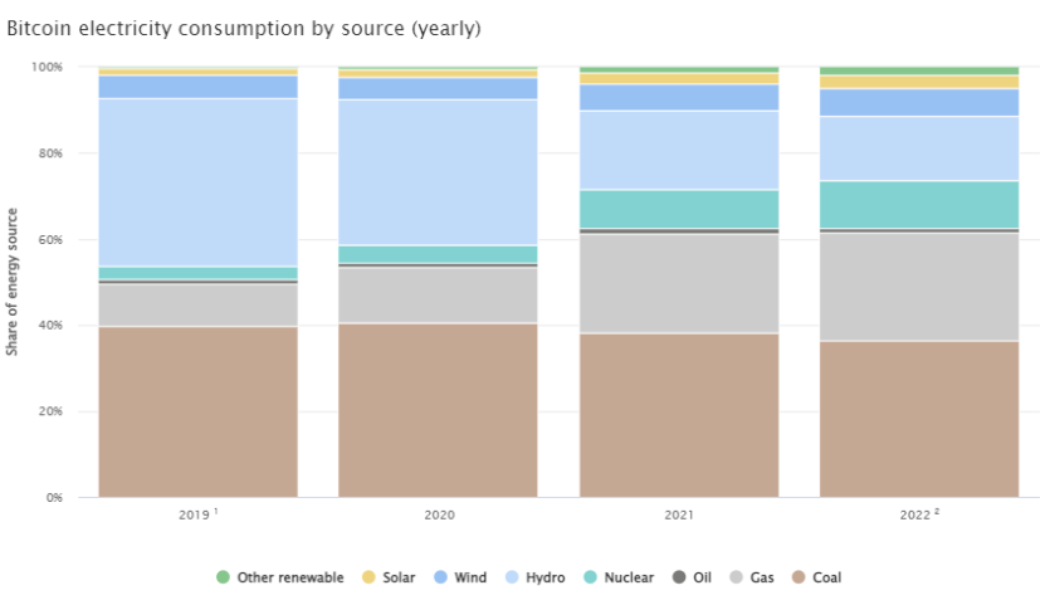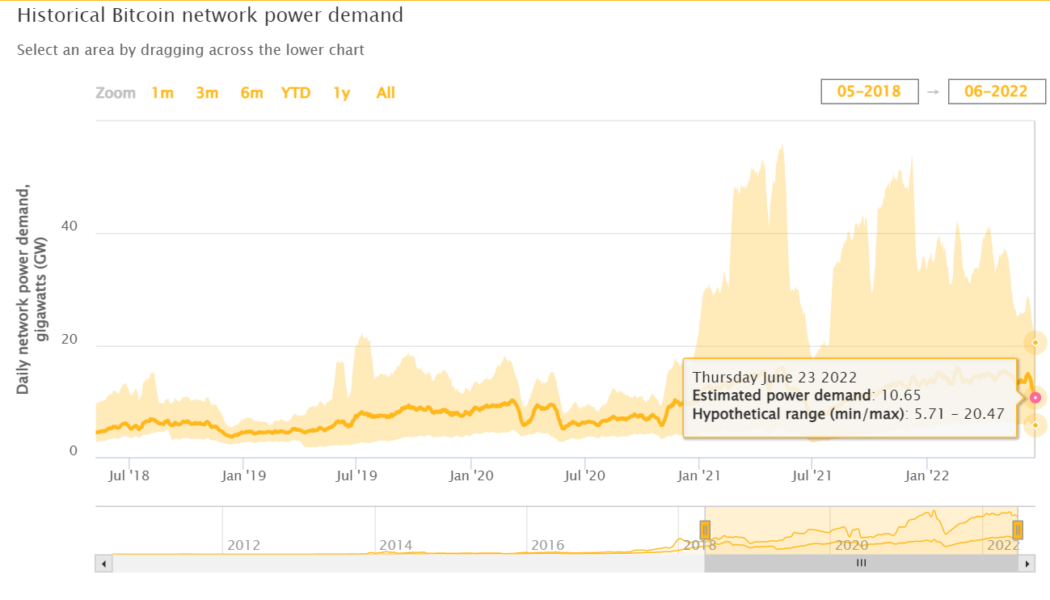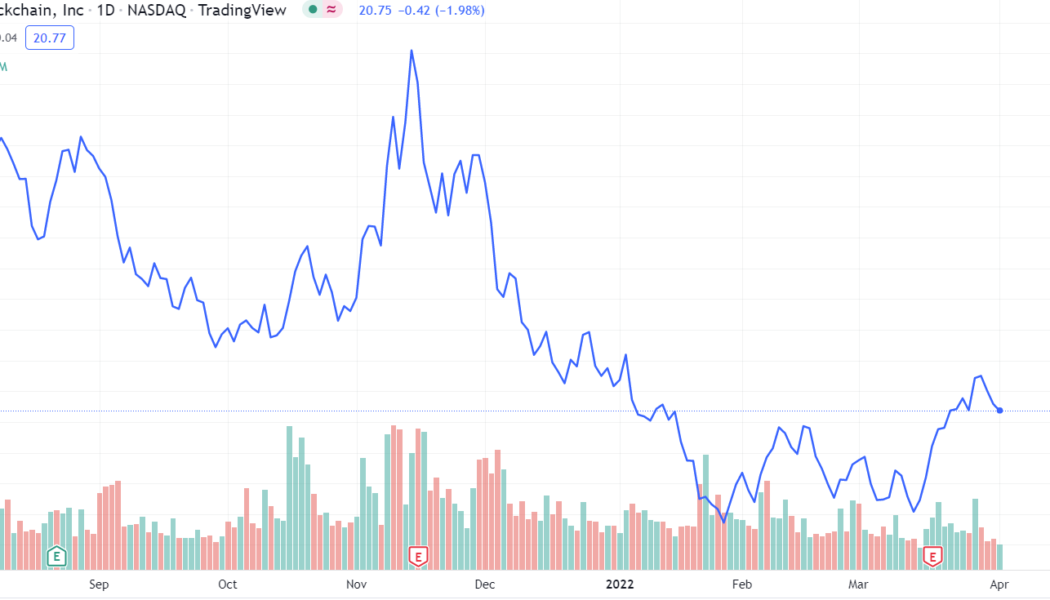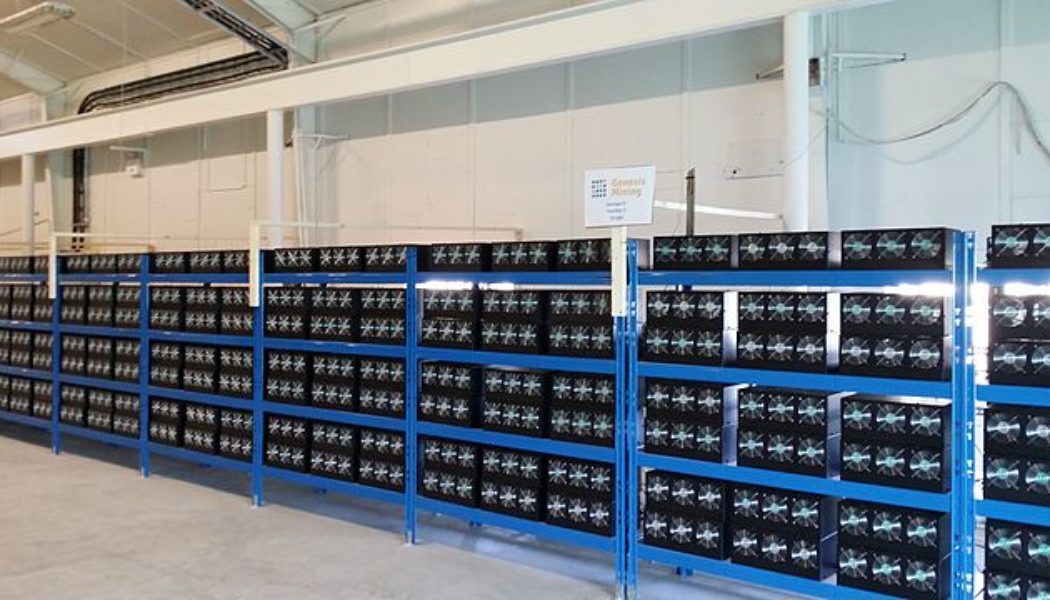Electricity
Quebec’s energy manager to seek government approval to stop powering crypto miners
Hydro-Québec, the firm managing electricity across the Canadian province of Quebec, plans to reallocate energy supplied to crypto mining firms. According to a Nov. 3 tweet from Canadian lawmaker Pierre Fitzgibbon, the government will request a decree from the energy board to release the company from its obligation to power crypto miners in the province. Hydro-Québec allocated 270 megawatts toward the mining firms, but electricity demand in Québec is expected to grow to a point that powering crypto will put pressure on the energy supplier. The report Hydro-Québec filed with the government’s energy board on Nov. 1 said temporarily reducing the power provided to mining firms could help prevent threats to the “reliability and security” of energy for Québec residents. The distributor repo...
Nuclear and gas fastest growing energy sources for Bitcoin mining: Data
The electricity mix of Bitcoin (BTC) has drastically changed over the past few years, with nuclear energy and natural gas becoming the fastest growing energy sources powering Bitcoin mining, according to new data. The Cambridge Centre for Alternative Finance (CCAF) on Tuesday released a major update to its Bitcoin mining-dedicated data source, the Cambridge Bitcoin Electricity Consumption Index (CBECI). According to the data from Cambridge, fossil fuels like coal and natural gas made up almost two-thirds of Bitcoin’s total electricity mix as of January 2022, accounting for more than 62%. As such, the share of sustainable energy sources in the BTC energy mix amounted to 38%. The new study suggests that coal alone accounted for nearly 37% of Bitcoin’s total electricity consumption as of earl...
Bitcoin network power demand falls to 10.65GW as hash rate sees 14% drop
The overall power consumption of the Bitcoin (BTC) network recorded a drastic drop after mimicking the two-week-long fall in the mining hash rate, which reduced the commuting power for mining BTC blocks to 199.225 exahash per second (EH/s). According to the data shared by the Cambridge Centre for Alternative Finance, the Bitcoin network recorded the year 2022’s lowest power demand of 10.65 gigawatts (GW). At its peak, the BTC network demanded 16.09 GW of power. Bitcoin network power demand from 2018-2022. Source: ccaf.io On June 16, a Cointelegraph report highlighted how the banking sector utilizes 56 times more energy than the Bitcoin ecosystem. Publisher Michel Khazzaka, an IT engineer, cryptographer and consultant said in an exclusive interview: “Bitcoin Lightning, and Bitcoin, in...
Bitcoin’s real energy use questioned as Ethereum founder criticizes BTC
The ever-raging debate around Bitcoin’s energy consumption has been re-ignited, with founding member of Ethereum Anthony Donofrio claiming that Bitcoin is using “way too much” energy. According to figures from Digiconomist, Bitcoin (BTC) currently uses 0.82% of the world’s power while Ethereum (ETH) uses 0.34%. Ethereum researcher Justin Drake posted the figures to his 56,000 followers that Donofrio retweeted, stating: If bitcoin is really using nearly 1% of the energy on earth that is way too much for a pet rock. https://t.co/CDL32jk5FF — Texture, PhD (@iamtexture) June 9, 2022 Ethereum proponents are attempting to take shots at Bitcoin while simultaneously promoting Ethereum’s upcoming transition to proof-of-stake, Drake added another tweet moments later that read: “Ethereum post-m...
Bitcoin miner Riot Blockchain files prospectus for $500M stock sale
In a document filed with the United States Securities and Exchange Commission (SEC) on Thursday, Bitcoin (BTC) mining company Riot Blockchain announced that it would be selling up to $500 million worth of common stock to finance general corporate expenses, such as working capital, repayment of corporate obligations, capital expenditures and acquisitions, and investing in existing and future projects. After the offering, the company would have more than 139 million units of common stock outstanding, giving it a market cap of close to $3 billion at Friday’s prices. The company is authorized to issue 170 million units of common stock in total. RIOT’s share price has experienced volatility over the past 12 months. Source: TradingView Currently, Riot Blockchain operates a flee...
Stranded no more? Bitcoin miners could help solve Big Oil’s gas problem
The energy usage and environmental impact of Bitcoin (BTC) mining have been frowned upon and been under the scanner by various international financial institutions. The International Monetary Fund (IMF) mentions how Bitcoin mining consumes “vast amounts of computing power and electricity.” Bitcoin mining is an energy-consuming process, as it is a proof-of-work (PoW) blockchain network that involves providing cryptographic proof to the network that a quantified amount of a specific computational effort has been used. The information used to verify this is stored in a block to be accepted into the network by other participants. Elon Musk, one of the richest men in the world and the co-founder and CEO of Tesla, in February 2021 announced that the car manufacturing company will accept Bi...
Mining worldwide: Where should crypto miners go in a changing landscape?
One of the main themes among the crypto community in 2021 was China’s aggressive policy toward mining, which led to a complete ban on such activities in September. While mining as a type of financial activity has not gone away and is unlikely to disappear, Chinese cryptocurrency miners had to look for a new place to set up shop. Many of them moved to the United States — the world’s new mining mecca — while some left to Scandinavia and others to nearby Kazakhstan, with its cheap electricity. Mining activities can’t stay under the radar forever, and governments around the world have begun to raise concerns over electricity capacity and power outages. Erik Thedéen, vice-chair of the European Securities and Markets Authority — who also serves as director general of the Swedish Fina...
Russian Ministry wants to legalize Bitcoin mining in specific areas
While the Russian government continues to work out a regulatory regime for digital assets, a federal ministry has made another proposal regarding the crypto mining industry. Russia’s Ministry of Economic Development has greenlighted the concept of crypto mining regulation in the country, proposing to allow mining operations in areas with “sustainable surplus in electricity generation,” local news agency Izvestia reported Tuesday. As part of the proposal, the ministry suggested introducing lower fees for setting up mining farms and data centers in specific Russian regions as well as offering reduced energy rates for such facilities. The ministry also wants to establish a power use limit for mining by individuals, reportedly proposing to introduce higher energy rates for increased energy spe...
Ethiopia urges Tigray rebels to join ceasefire, hostilities persist
Ethiopia’s government urged Tigrayan rebels to join a unilateral ceasefire in their conflict on Thursday as aid agencies struggled to reach hundreds of thousands of people facing famine. The Tigray People’s Liberation Front (TPLF), the former rulers of Ethiopia’s Tigray region, said on Monday it was back in control of the regional capital Mekelle after nearly eight months of fighting. The government declared a unilateral ceasefire but the TPLF dismissed it as a joke. Hostilities persisted on Thursday and pressure built internationally for all sides to pull back. “Operations are under way … and the number of prisoners of war is increasing by the minute,” TPLF spokesman Getachew Reda told Reuters by satellite phone, with light artillery fire crackling in the background. “We are closing in on...























